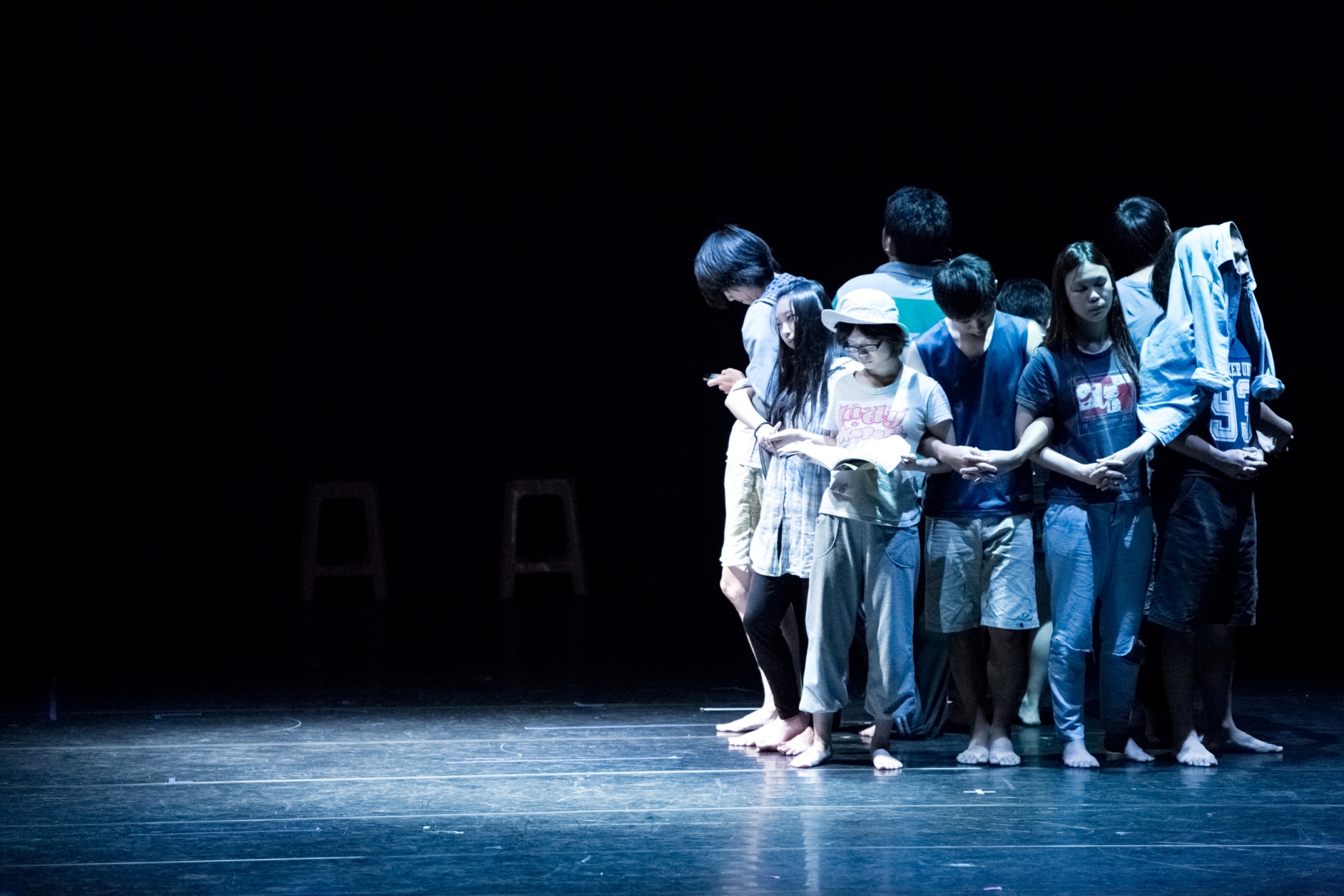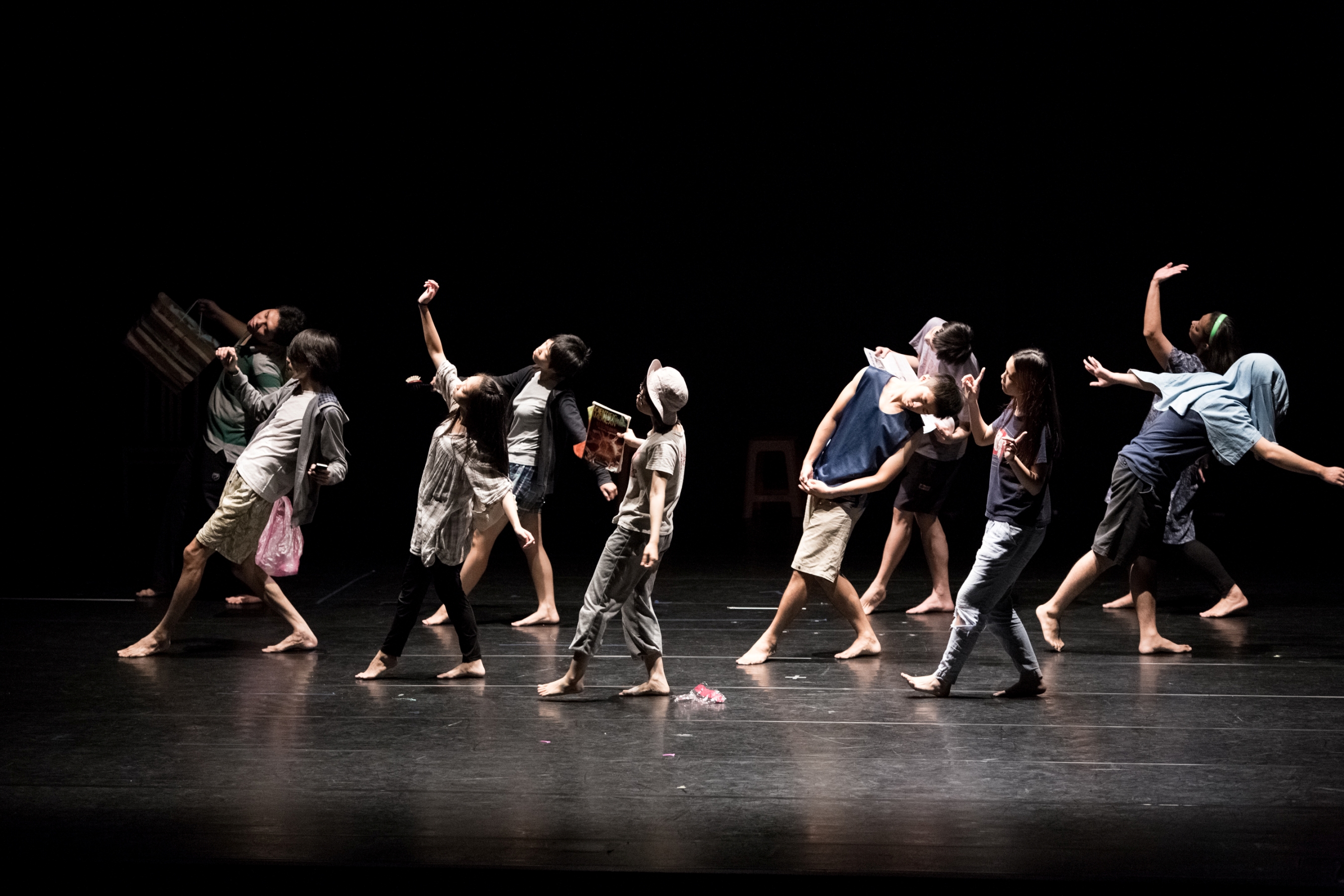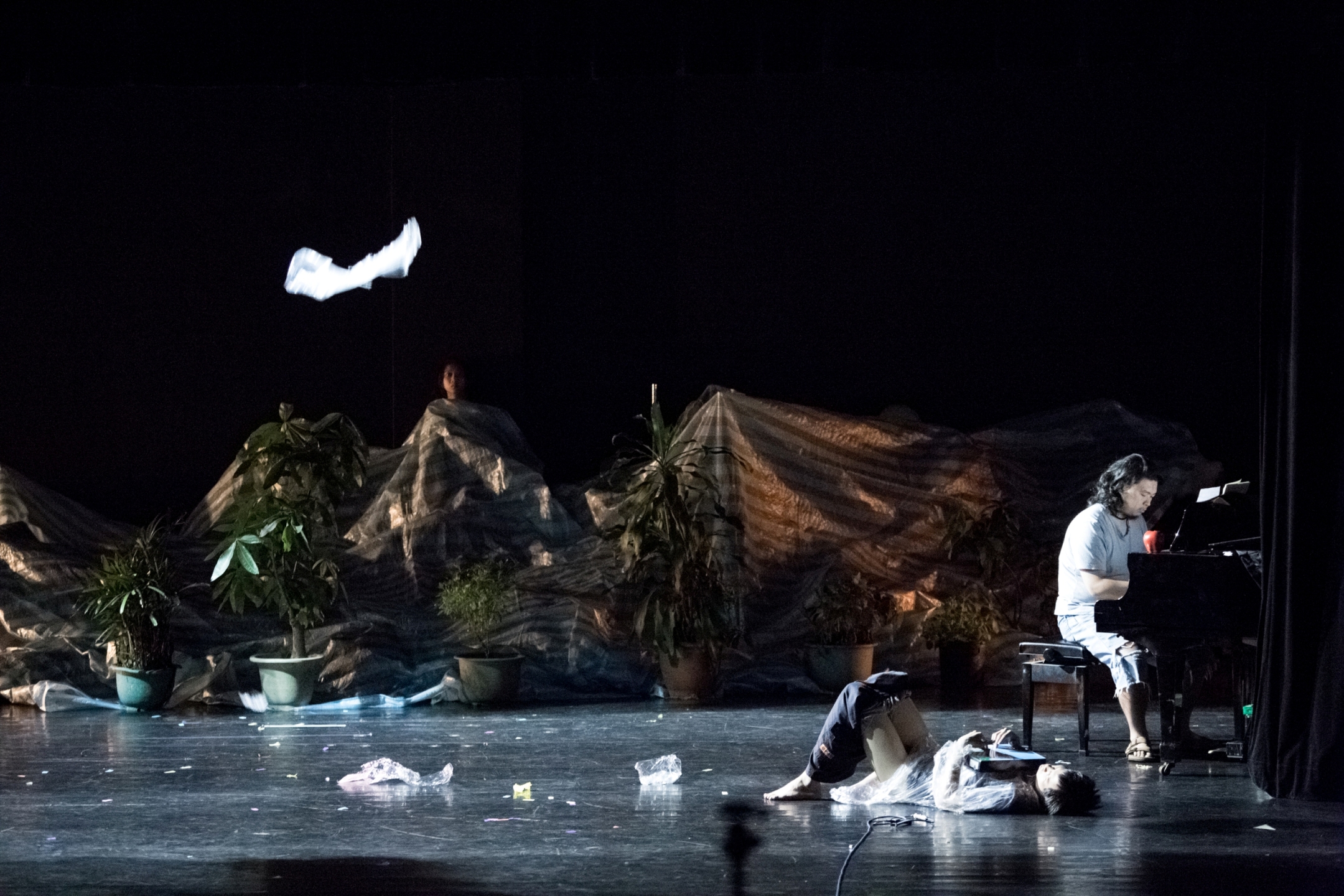《Dear All》以簡便及機動性高為舞台使用原則,意圖結合大道具的使用延伸組合意象,發展成為眾多大小雜物、物件容同的垃圾回收集合場。同時利用劇場的觀看與空間特質,發展類劇情的作品脈絡,以庶民生活娛樂及場景環境如:飯後新聞娛樂節目、大特價花車Shopping、三五好友夜唱喝酒、抗議集會場合、病院家屬探視、大眾運輸交通工具等,做為演出進行的主要場景,結合如同垃圾場一般的視覺場景,以劇場魔幻的表演狀態或是空的空間之物件借代,展演所有習以為常甚而無感的生活景觀與通俗經驗。意圖反映人在流於娛樂化或扁平的情感溝通媒體與真實際遇之間的可能體現。
演員在舞台上,若有似無的表演,讓意象不斷翻轉,隨著劇情歇斯底里的發展,舞台上的垃圾也不斷增生,反應出我們彷彿被不斷廢棄化的人生。
In Dear All, the basic principle for the stage is to use light and easily movable objects with the aim of creating numerous theatrical spectacles by accumulating objects of various sizes in a landfill. At the same time, the general scheme of the theatrical work is developed by employing theatrical spectatorship and the characteristics of space, as well as scenes of everyday life and the environment such as prime time television programs, wholesale shopping, partying and drinking with friends, gathering for a protest, visiting patients at the hospital, and taking public transit. Such scenes occur primarily within a landfill on stage, presenting common life experiences with the illusions created through performance and the metonymic object, and acting out the mundane, senselesness in the background of life and everyday experience. The work aims to reflect the possible consequences when people indulge in popular entertainment and emotional repression.
The seemingly non-existent acting by the performers on stage constantly inverts images as the storyline further develops into absurdity. The amount of garbage on stage also increases, reflecting our lives, which are continuously turning into waste.
李銘宸 LI Ming-Chen
風格涉核心創作。畢業於國立臺北藝術大學戲劇學系,主修導演。作品多發展自物件及場域,以集體即興創作之方式,並置或賦予其視聽文本,關注空間質地及材質與人的關係。劇場導演作品包括《漸慢》、《超人戴肯的黃金時代》、《不萬能的喜劇》、《歡樂年華》。
Artistic director of StyleLab. Graduated with a major in directing from the Theater department at Taipei National University of the Arts. His works often explore the relationship between objects and the environment, employing collective improvisation as an artistic methodology together with installation or bestowal of audiovisual texts to highlight spatial properties and the essence of human relationships. His directing credits include Retenu, Dyken: The Golden Age of Superman, Not Universal Comedy, and Happy Days.
李銘宸
李瑋倩
陳冠霖
賴科竹
尹宣方、江敘慈、吳立翔、李祐緯、胡書綿、陳以恩、陳有銳、陳煜典、劉育松、楊智淳
文山劇場
關鍵字
- 集體創作
- 戲劇
- 垃圾
- 物件
- 符號
- 翻轉
- 醜
- 非敘事
- 日常生活
- 物件劇場
藝術家談作品
好的事情真的好嗎?
「好的事情真的好嗎?」
「不好的事情真的不好嗎?」
「我們以為的真誠是真誠嗎?」
「我們以為的正義是正義嗎?」
評審談作品
為台灣表演藝術開創嶄新的形式,表達對環境和人文的社會關懷。
入圍理由 Reason for Nomination
《Dear All》以「物件劇場」的形式,創造一個垃圾的空間,讓我們從另一個角度,看見當代的物質生活。
宛若八點檔的夜市人生,故事背後延展出畸零、背叛、傷痛、死亡等情狀,描摹「親愛的我們」可悲可情的多面。導演善用翻轉、重寫的手法,前一刻看似正常的關係,下一刻忽然反面化,荒謬與笑點並置;最精彩處在於,導演透過集體即興手法連番翻轉層層關係之餘,也將道具、舞台「即興化」,類似垃圾的物件因而布滿舞台,這些物件同時成為視覺意象,直指一幅垃圾拼裝的物質人生。《Dear all》可看做八0後青年世代小劇場工作者善於將語言、劇情、結構「解構化」,對語意、記號學駕輕就熟;就《Dear all》來說,不只玩弄反面手法,也試圖深入社會底層或生命幽微暗影,讓我們看見青年世代面對社會真實不迴避的態度。提名觀察人─ 紀慧玲
Through the form of “object theater”, a space of waste is created, allowing us to see from another angle the material life of contemporary time.
Just like soap opera, the scenes of loss, betrayal, sorrow, and death, the multiple dimensions of sadness and emotions of “Dear us” are thus laid in front of us. The director utilizes methods of reversing and rewriting, so that the seemingly normal relationship a brief moment ago will suddenly be reversed in the next, juxtaposing absurdity and comedy. The most interesting part is, the director reverses layers of relationships through collective improvisation, and at the same time, “improvises” the props and stage; consequently, objects that seem to be garbage are scattered on the stage, and they all become the visual image, suggesting a life assembled from garbage. “Dear All” can be regarded the skilled “deconstruction” of language, storyline, and structure by a young generation small theater worker of the post-1980s, showcasing high maturity in the ability to separate semantics and symbols. The director is not just playing with reversals, but also attempts to venture deeply into the bottom of the society or the dark places of life, allowing us to see the head-on attitude of the young generation when faced with social realities. Nominators: CHI Hui-Ling
年度入選獎得獎理由 Reasons for being Shortlisted
以垃圾為物件,搬演我們的日常生活,演員在舞台上,若有似無的表演,讓意象不斷翻轉,隨著劇情歇斯底里的發展,舞台上的垃圾也不斷增生,反應出我們彷彿被不斷廢棄化的人生。李銘宸玩弄舞台的記號,創造出獨特的劇場風格,為台灣表演藝術開創嶄新的形式,表達對環境和人文的社會關懷。複選委員 ─ 陳泰松、林于竝、邱坤良、阮慶岳、林曼麗、陳昌仁、陳郁秀、石瑞仁、吳靜吉
Using garbage as objects, the play depicts our daily life. The seemingly non-existing acting by performers on stage constantly reverses the images; as the storyline further expands into absurdity, amount of garbage on stage also increases, reflecting our life that is continuously turning into waste. Li plays with symbols of stage to create a unique style of theatre, exploring new forms for Taiwan’s performing art and expressing social concerns for the environment and humanities. Semi-selection jury: CHEN Tai-Song, LIN Yu-Pin, CHIU Kun-Liang, ROAN Ching-Yueh, CHEN Chan-Jen, CHEN Yu-Hsiu, SHIH Jui-jen, LIN Man-Li, WU Jing-Jyi






